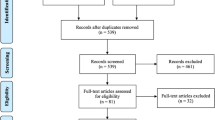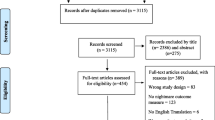Abstract
Nightmares are a universal and timeless phenomenon. They occur in most healthy adults as well as a significant portion of clinical populations, especially those exposed to trauma. Considerable advances in the pharmacological and psychological treatment of post-traumatic nightmares have occurred over the last decade with continuing advances in psychological interventions over the last few years. Pharmacologically, the medication prazosin is showing robust clinical effects with minimal side effects. Psychologically, imagery rehearsal therapy commands the greater portion of the nightmare literature due to its established efficacy. These issues are reviewed in the following paper along with recommendations for future studies.
Similar content being viewed by others
References
Papers of particular interest, published recently, have been highlighted as: • Of importance •• Of major importance
Belanger J, Dalley K. The Nightmare Encyclopedia: your darkest dreams interpreted. Franklin Lakes, NJ: The Career Press; 2006.
Moore BA, Krakow B. Imagery rehearsal therapy: an emerging treatment for post-traumatic nightmares in veteran’s psychological trauma. Theor Res Pract Policy. 2010;2:232–8.
Belicki D, Belicki K. Nightmares in a university population. Sleep Res. 1982;11:116.
Belicki K, Belicki D. Predisposition for nightmares: a study of hypnotic ability, vividness of imagery, and absorption. J Clin Psychol. 1986;42:714–8.
Feldman MJ, Hersen M. Attitudes toward death in nightmare subjects. J Abnorm Psychol. 1967;72:421–5.
Levin R. Sleep and dreaming characteristics of frequent nightmare subjects in a university population. Dreaming. 1994;4:127–37.
Wood J, Bootzin R. The prevalence of nightmares and their independence from anxiety. J Abn Psychol. 1990;99:64–8.
Nielsen TA, Zadra AL. Dreaming disorders in principles and practices in sleep medicine. In: Kryger MH, Roth T, Dement WC, editors. Principle and practices of sleep medicine. 3rd ed. Philadelphia: WB Saunders; 2000.
Barrett D. Trauma and dreams. Cambridge, MA: Harvard University Press; 1996.
Lifton JR, Olsen E. The human meaning of total disaster: the Buffalo Creek experience. Psychiatry. 1976;39:1–18.
Low JF, Dyster-Aas J, Willebrand M, Kildal M, Gerdin B, Ekselius L. Chronic nightmares after severe burns: risk factors and implications for treatment. J Burn Care Rehabil. 2003;24:260–7.
Kilpatrick DG, Resnick HS, Freedy JR, Pelcovitz D, Resick P, Roth S, et al. Post-traumatic stress disorder field trial: evaluation of the PTSD construct? Criteria A through E. In: Widiger TA, Frances AJ, Pincus HA, Ross R, First MB, Davis W, editors. DSM-IV sourcebook, vol. 4. Washington, DC: American Psychiatric Association Press; 1998. p. 803–6.
Krakow B, Melendrez D, Pedersen B, Johnston L, Hollifield M, Germain A, et al. Complex insomnia: insomnia and sleep-disordered breathing in a consecutive series of crime victims with nightmares and PTSD. Biol Psychiatry. 2001;49:948–53.
Ross RJ, Ball WA, Sullivan KA, Caroff SN. Sleep disturbance as the hallmark of post-traumatic stress disorder. Am J Psychiatry. 1989;146:697–707.
DeViva JC, Zayfert C, Mellman TA. Factors associated with insomnia among civilians seeking treatment for PTSD: an exploratory study. Behav Sleep Med. 2004;2:162–76.
Krakow B, Hollifield M, Schrader R, Koss M, Tandberg D, Lauriello J, et al. A controlled study of imagery rehearsal for chronic nightmares in sexual assault survivors with PTSD: a preliminary report. J Trauma Stress. 2000;13:589–609.
Zayfert C, DeViva JC. Residual insomnia following cognitive behavioral therapy for PTSD. J Trauma Stress. 2004;17:69–73.
University of Maryland. Sleep disorders. Available at: http://www.umm.edu/sleep/sleep_dis_main.htm. Accessed on February 2012.
Spoormarker VI, Montgomery P. Disturbed sleep in post-traumatic stress disorder: secondary symptoms or core feature. Sleep Med Rev. 2008;12:169–84.
American Academy of Sleep Medicine. Nightmares. Available at: http://yoursleep.aasmnet.org/disorder.aspx?id=37. Accessed February 2012.
Moore BA, Krakow B. Characteristics, effects, and treatment of sleep disorders in service members. In: Freeman MS, Moore BA, Freeman A, editors. Living and surviving in harm's way: a psychological treatment handbook for pre- and post-deployment of military personnel. New York, NY: Routledge; 2009. p. 281–306.
Armenian Medical Network. Nightmare disorder (formerly dream anxiety disorder). Available at: http://sleep.health.am/sleep/more/nightmare-disorder/ . Accessed February 2012.
Moore BA, Kraków B. Imagery rehearsal therapy: an emerging treatment for post-traumatic nightmares in veterans. Psychol Trauma Theory Res Pract Policy. 2010;2(3):232–8.
•• Aurora RN, Zak RS, Auerbach SH, Casey KR, Chowdhuri S, Karripot A, et al. Best practice guide for the treatment of nightmares disorder in adults. J Clin Sleep Med. 2010;6(4):389–401. This is a blind, peer-review, comprehensive evaluation of current pharmacological and non pharmacological approaches to the treatment of nightmares in adults.
Phillips B, Ball C, Sackett D, Badenoch B, Straus S, Haynes M, et al. Oxford Centre for Evidence-based Medicine - Levels of Evidence. Available at: http://www.cebm.net/index.aspx?o=1025. Accessed February 2012.
Fitch K, Bernstein SJ, Aguilar MD, Burnand B, LaCalle JR, Lazaro P, et al. The RAND/UCLA appropriateness method user's manual. Santa Monica, CA: RAND; 2001.
Taylor FB, Martin P, Thompson C, Williams J, Mellman TA, Gross C, et al. Prazosin effects on objective sleep measures and clinical symptoms in civilian trauma PTSD: a placebo-controlled study. Biol Psychiatry. 2008;63:629–32.
Ross RJ, Gresch PJ, Ball WA, Sanford LD, Morrison AR. REM sleep inhibition by desipramine: evidence for an α-1 adrenergic mechanism. Brain Res. 1995;701:129–34.
Taylor F, Raskind MA. The alpha1-adrenergic antagonist prazosin improves sleep and nightmares in civilian trauma post-traumatic stress disorder. J Clin Psychopharmacol. 2002;22:82–5.
Calohan J, Peterson K, Peskind EP, Raskind MA. Prazosin treatment of trauma nightmares and sleep disturbance in soldiers deployed in Iraq. J Trauma Stress. 2010;23:645–8.
Guy W. ECDEU Assessment manual for psychopharmacology. ADM 76-338, Rockville, MD: U.S. Department of Health, Education and Welfare; 1976. p. 218–22.
Blake DD, Weathers FW, Nagy LL, Kaloupek DG, Gusman FD, Charney DS, et al. The development of a clinician-administered PTSD scale. J Trauma Stress. 1995;8:75–90.
Raskind MA, Peskind ER, Kanter ED, Petrie EC, Radant A, Thompson CE, et al. Reduction of nightmares and other PTSD symptoms in combat veterans by prazosin: a placebo-controlled study. Am J Psychiatry. 2003;160:371–3.
Germain A, Richardson R, Moul DE, Mammen O, Haas G, Forman SD, et al. Placebo-controlled comparison of prazosin and cognitive-behavioral treatments for sleep disturbances in US military veterans. J Psychosom Res. 2012;72:89–96.
Khachiyants N, Ali R, Kovesdy CP, Detweiler JG, Kim KY, Detweiler MB. Effectiveness of risperidone for the treatment of nightmares in veterans with post-traumatic stress disorder. J Clin Psychopharmacol. 2010;30:735–7.
Ahern EP, Krohn A, Connor KN, Davidson JR. Pharmacologic treatment of post-traumatic stress disorder. a focus on antipsychotic use. Ann Clin Psychiatr. 2003;15:193–201.
Raskin MA, Peskind ER, Kanter ED, Petrie EC, Radant A, Thompson CE, et al. Reduction of PTSD nightmares and other PTSD symptoms in combat veterans by prazosin: a placebo-controlled study. Am J Psychiatry. 2003;160:371–3.
Krystal AD, Davidson JRT. The use of prazosin for the treatment of trauma nightmares and sleep disturbance in combat veterans with post-traumatic stress disorder. Biol Psychiatry. 2007;61:925–7.
Detweiler MB, Khachiyants N, Detweiler JG, Ali R, Kim KY. Risperidone for post-traumatic combat nightmares: a report of 4 cases. Consult Pharm. 2011;26:920–8.
Attarian H. Treatment options for parasomnias. Neurol Clin. 2010;28:1089–106.
Tien-Chun L, Pi-Yu S, Hsiu-Wen C, Chia-Ho P. Trazodone ameliorates nightmares in major depressive disorder. J Neuropsychiatry Clin Neurosci. 2011;23:E4.
Bajor LA, Ticlea AN, Osser DN. The psychopharmacology algorithm project at the Harvard south shore program: an update on post-traumatic stress disorder. Harv Rev Psychiatr. 2011;19:240–58.
U.S. National Institutes of health. Clinical trials.gov. Available at: http://www.clinicaltrials.gov/ct2/results?term=nightmares+treatment. Accessed February 2012.
Davis JL, Pruiksma KE, Rhudy JL, Byrd P. A comparison of lifelong and post-trauma nightmares in a civilian trauma sample: nightmare characteristics, psychopathology, and treatment outcome. Dreaming. 2011;21:70–80.
Krakow B, Zadra A. Clinical management of chronic nightmares: imagery rehearsal therapy. Behav Sleep Med. 2006;4(1):45–70.
• Nappi CM, Drummond SP, Hall JM. Treating nightmares and insomnia in post-traumatic stress disorder: a review of current evidence. Neuropharmacology. 2012;62:576–85. This is a current review on current behavioral and pharmacological treatments for post-traumatic nightmares and insomnia.
Nappi CM, Drummond SP, Thorp SR, McQuaid JR. Effectiveness of imagery rehearsal therapy for the treatment of combat-related nightmares in veterans. Behav Ther. 2010;41:237–44.
Lancee J, Spoormaker VI, van den Bout J. Cognitive-behavioral self-help treatment for nightmares: a randomized controlled trial. Psychother Psychosom. 2010;79:371–7.
Lancee J, van den Bout J, Spoormaker VI. Expanding self-help imagery rehearsal therapy for nightmares with sleep hygiene and lucid dreaming: a waiting-list controlled trial. Int J Dream Res. 2010;3:111–20.
Cook JM, Harb GC, Gehrman PR, Cary MS, Gamble GM, Forbe I, et al. Imagery rehearsal for post-traumatic nightmares: a randomized controlled trial. J Trauma Stress. 2010;23:553–63.
Ulmer CS, Edinger JD, Calhoun PS. A multi-component cognitive-behavioral intervention for sleep disturbance in veterans with PTSD: a pilot study. J Clin Sleep Med. 2011;7:57–68.
Davis JL, Rhudy JL, Pruiksma KE, Bryd P, Williams AE, MsCabe KM, et al. Physiological predictors of response to exposure, relaxation, and rescripting therapy for chronic nightmares in a randomized clinical trial. J Clin Sleep Med. 2011;7:622–63.
Rhudy JL, Davis JL, Williams AE, MsCabe KM, Bartley EJ, Bryd P, et al. Cognitive-behavioral treatment for chronic nightmares in trauma-exposed persons: assessing physiological reactions to nightmare-related fear. J Clin Psychol. 2010;66:365–82.
Wanner J, Long ME, Teng EJ. Multi-component treatment for post-traumatic nightmares in Vietnam veterans: 2 case studies. J Psychiatr Pract. 2010;16:243–9.
Long ME, Davis JL, Springer JR, et al. The role of cognitions in imagery rescripting for post-traumatic nightmares. J Clin Psychol. 2011;67:1008–16.
Long ME, Hammons ME, Davis JL, Frueh BC, Khan MM, Elhai JD, et al. Imagery rescripting and exposure group treatment of post-traumatic nightmares in Veterans with PTSD. J Anxiety Disord. 2011;25:531–5.
Lancee J, Spoormaker VI, van den Bout J. Long-term effectiveness of cognitive-behavioral self-help intervention for nightmares. J Sleep Res. 2011;20:454–9.
Been G, Garg V. Nightmares in the context of PTSD treated with psychoeducation regarding lucid dreaming. Aust N Z J Psychiatr. 2010;44:583.
Gehrman PR, Harb GC. Treatment of nightmares in the context of post-traumatic stress disorder. J Clin Psychol. 2010;66:1185–94.
Disclosure
M. Escamilla: none; M. LaVoy: none; B. A. Moore: has been a consultant to Neuroscience Education Institute, has received payment for lectures including service on speakers bureaus from CMI/PESI, and has received royalties from Wiley, Guilford, APA, Routledge & Pearson; B. Krakow: has been a consultant to AMEDD Center & School; has received grants from Simon Foundation and Oxynard Foundation; has received royalties from Wiley, Maimonides Sleep Arts and Sciences, and The New Sleepy Times; and owns and operates 4 websites that provide education and offer products for sleep disorders patients.
Author information
Authors and Affiliations
Corresponding author
Rights and permissions
About this article
Cite this article
Escamilla, M., LaVoy, M., Moore, B.A. et al. Management of Post-Traumatic Nightmares: A Review of Pharmacologic and Nonpharmacologic Treatments Since 2010. Curr Psychiatry Rep 14, 529–535 (2012). https://doi.org/10.1007/s11920-012-0306-7
Published:
Issue Date:
DOI: https://doi.org/10.1007/s11920-012-0306-7




